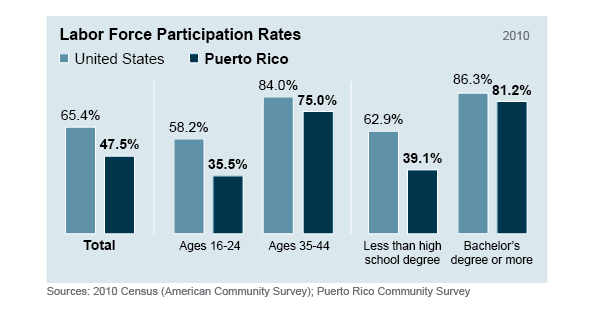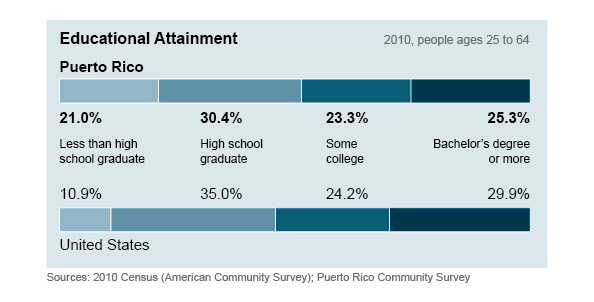|
Puerto Rico has made noteworthy efforts in recent years to address different aspects of these complex and interrelated challenges. But more can be done. We present five policy recommendations. Several reflect themes that have been actively discussed and debated—and in a few cases, already addressed—on the Island. The recommendations should not be viewed as providing a quick fix, but rather as important steps to help improve Puerto Rico’s competitiveness over time. We present these recommendations for consideration and discussion, and invite feedback from stakeholders on the Island regarding their implementation and expected impacts, as well as any additional actions that may strengthen their effectiveness.
Recommendation 1: Reduce Barriers to Job Creation and Labor Force Participation
Creating jobs and encouraging active participation in the labor market should be a top priority for policymakers. Opportunities for the young and less educated in Puerto Rico are particularly limited, and these workers are in danger of becoming disconnected from the labor market. We recommend focusing on policies that spur the creation of job opportunities and improve incentives to work. One possible first step would be to consider a young-worker subminimum wage that targets workers under the age of 25. The minimum could be stepped up at regular intervals as the worker continues employment and builds skills with a given firm, so that the worker’s wage would match the federal minimum over a number of years. A wider reexamination of the application of the federal minimum wage and the design of entitlement programs may also be warranted in order to improve incentives to seek employment and increase the number of jobs available for workers on the Island.

Recommendation 2: Reform the Energy Industry
An efficient and competitive energy sector is essential for the wider success of the Puerto Rican economy. Best practice suggests that a regulatory commission should be established to oversee the Puerto Rico Electric Power Authority to protect consumers and improve the efficiency of the utility’s operations. It is standard on the U.S. mainland as well as in other countries for a monopoly utility to be subject to regulatory oversight, even when the utility is government owned. The rules to allow the renewable-energy industry access to the power grid should be clarified; one solution would be to adopt the wholesale market rules used on the U.S. mainland.
Recommendation 3: Lower the Costs of Doing Business
Independent studies suggest that Puerto Rico continues to lag the mainland and regional peers in ease of doing business, though these studies find some progress in recent years. Continued systematic effort to further streamline regulatory processes and reduce red tape appears to be warranted. Separately, the high cost of shipping is a substantial burden on the Island’s productivity. Puerto Rico is in a distinctive situation with respect to the Jones Act because of its status as an island economy. One option could be to seek a temporary exemption from the Jones Act, for instance for five years, in order both to evaluate whether or not these restrictions really are a substantial cause of elevated shipping costs and to allow for assessment of the costs and benefits of a permanent exemption.
Recommendation 4: Foster Partnerships between Industry and Higher Education
Colleges and universities are important assets that can help Puerto Rico actively participate in the knowledge economy. One way the Island can build on these assets is to foster partnerships between private industry and higher-education institutions. These partnerships tend to offer localized economic benefits by increasing economic activity associated with the creation, development, and commercialization of new products or processes. One way forward would be for the government of Puerto Rico or a non-profit institution on the Island to help establish a center of excellence focusing on the development of globally important technologies by providing seed funding and incentivizing industry investment. Moreover, commercialization of academic research should be more actively supported. An initial step in this process might be the formation of a task force made up of members of academia, industry, non-profit institutions, and government to identify the most promising opportunities in Puerto Rico.

Recommendation 5: Promote Independent Policy Evaluation
The economy’s growth potential is strongly influenced by the quality of government policies. Accordingly, greater efforts should be made to evaluate specific policies routinely to determine if the benefits exceed the costs; in this way, the best ideas will have a chance to be adopted while those found lacking can be eliminated. The effectiveness of government policies also depends on data on the economy’s structure and operation. More resources should be devoted to improving and expanding economic indicators for the Island in order to bring them into line with the indicators regularly used to track regional conditions on the U.S. mainland.
|












